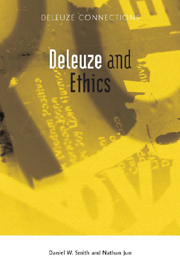Book contents
- Frontmatter
- Contents
- Acknowledgments
- Introduction
- 1 Whistle While You Work: Deleuze and the Spirit of Capitalism
- 2 The Ethics of the Event: Deleuze and Ethics without Aρχή
- 3 While Remaining on the Shore: Ethics in Deleuze's Encounter with Antonin Artaud
- 4 Responsive Becoming: Ethics between Deleuze and Feminism
- 5 Deleuze, Values, and Normativity
- 6 Ethics and the World without Others
- 7 Deleuze and the Question of Desire: Towards an Immanent Theory of Ethics
- 8 “Existing Not as a Subject But as a Work of Art”: The Task of Ethics or Aesthetics?
- 9 Deleuze, Ethics, Ethology, and Art
- 10 Never Too Late? On the Implications of Deleuze's Work on Death for a Deleuzian Moral Philosophy
- 11 Ethics between Particularity and Universality
- Notes on Contributors
- Index
8 - “Existing Not as a Subject But as a Work of Art”: The Task of Ethics or Aesthetics?
Published online by Cambridge University Press: 12 September 2012
- Frontmatter
- Contents
- Acknowledgments
- Introduction
- 1 Whistle While You Work: Deleuze and the Spirit of Capitalism
- 2 The Ethics of the Event: Deleuze and Ethics without Aρχή
- 3 While Remaining on the Shore: Ethics in Deleuze's Encounter with Antonin Artaud
- 4 Responsive Becoming: Ethics between Deleuze and Feminism
- 5 Deleuze, Values, and Normativity
- 6 Ethics and the World without Others
- 7 Deleuze and the Question of Desire: Towards an Immanent Theory of Ethics
- 8 “Existing Not as a Subject But as a Work of Art”: The Task of Ethics or Aesthetics?
- 9 Deleuze, Ethics, Ethology, and Art
- 10 Never Too Late? On the Implications of Deleuze's Work on Death for a Deleuzian Moral Philosophy
- 11 Ethics between Particularity and Universality
- Notes on Contributors
- Index
Summary
It's to do with abolishing ways of existing or, as Nietzsche put it, inventing new possibilities of life. Existing not as a subject but as a work of art – and this last phase presents thought as artistry.
(Deleuze 1995a: 95)Deleuze endorsed repeatedly the well-known conviction of Michel Foucault and of Nietzsche that life had to be lived as a work of art. This raises the question whether the terms under which a life is led properly belong to ethics (this of course being the traditional or consensual position taken when it comes to answering the question “how should I lead my life?”). But to suggest that life be led as a work of art implies, palpably, that it is aesthetics, and not ethics, which superintends the question “how should I lead my life?” At one level the answer to this question can only be altogether commonplace and quite worn-out – of course the answer given depends on how “ethics” and “aesthetics” are defined! But at another level it certainly isn't trivial. If Deleuze had an ethics, then what kind of ethics is it, and is it an ethics with a depth and scope capable of superintending the question “how should I lead my life”? Or would this task be left to an aesthetics, and, if so, what kind of aesthetics did Deleuze have? Or are ethics and aesthetics related in such a way in Deleuze's thought that it is both ethics and aesthetics which oversee the terms of the question “how should I lead my life”? And if that is the case, then how does Deleuze conceive of the relation between ethics and aesthetics, and how do they function conjointly when dealing with the question of leading one’s life as a work of art?
- Type
- Chapter
- Information
- Deleuze and Ethics , pp. 142 - 153Publisher: Edinburgh University PressPrint publication year: 2011

